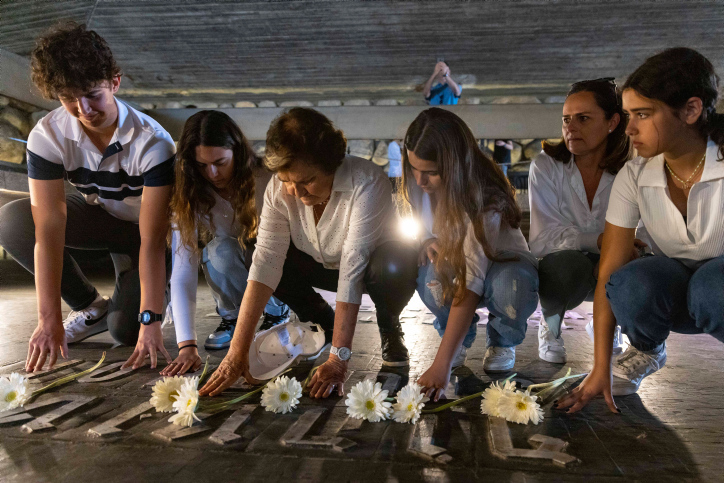
There are currently an estimated 132,826 Holocaust survivors living in Israel according to data published by the Ministry of Welfare and Social Affairs in advance of Holocaust and Heroism Remembrance Day, which was observed today throughout the country. The ministry further noted that 86 Holocaust survivors who had been evacuated from their homes along Israel’s northern and southern borders since the outbreak of the war have passed away.
About 2,500 Holocaust survivors experienced the events of October 7, including Moshe Ridler, 91, from Kibbutz Holit, who was murdered, and Shlomo Mansour, 86, who is still being held hostage in Gaza. About 2,000 Holocaust survivors were forced to abandon their homes and evacuate as a result.
According to the ministry, 52 Holocaust survivors who were evacuated from Ashkelon after October 7 have passed away, as well as 12 survivors who were evacuated from Sderot and 11 from various other communities in the south. Eleven Holocaust survivors who were evacuated from northern communities such as Shomera, Metula, Kibbutz Dan, Shlomi, and Kibbutz Yiron have also passed away.
The statistics also show that 238 Holocaust survivors who were evacuated to hotels have since left them, some returning to their homes while others moved to new places. In Ashkelon, for example, 122 Holocaust survivors left the hotels, while in Sderot, 33 left. Most of the survivors who were evacuated from the north, on the other hand, have remained in the evacuation centers, like the rest of the residents.
An Increasing Need for Welfare
Forty-two percent of Holocaust survivors in Israel receive services from the Ministry of Welfare. The ministry provides services to approximately 48,610 survivors, compared to 45,300 last year. It noted that the proportion of survivors receiving aid increased from 35% to 42%, but alongside the expansion of services for survivors, the number of Holocaust survivors living in Israel has dropped: from approximately 150,000 last year to only 132,386.
More than 1,000 Holocaust survivors are part of programs to alleviate loneliness and strengthen intergenerational ties through two-way digital communication technology systems for remote contact and physical meetings, which aim to improve the quality of life of Holocaust survivors in the community by reducing loneliness, strengthening a sense of belonging, and promoting digital literacy.
The Ministry of Welfare stated that they have developed new standards for the care and assistance of Holocaust survivors by local authorities, alongside the expansion of community services to all senior citizens in the State of Israel. The ministry operates various programs to assist Holocaust survivors amounting to tens of millions of shekels per year, which include social activities, connection to social circles, food security, material and therapeutic assistance, and access to services for those who have difficulty moving around on their own.
About 70 social clubs operate across the country that provide a social response alongside food security, in a framework that includes meals and transportation. Alongside these are the "Cafe Europa" clubs dedicated to serving Holocaust survivors, "Warm Homes" where leisure activities are carried out to prevent loneliness, and communities where a wider range of needs are met, especially assistance at home. For Holocaust survivors who are confined to their homes, the ministry operates a program,which brings a package of adapted services to the Holocaust survivor's home.
Unlike other services provided by the ministry that require compliance with criteria and income tests, the services for Holocaust survivors are available to the entire population and information about the various services can be obtained at the Welfare Ministry’s hotline (*118) or at the municipal government hotline (*106).
Minister of Welfare and Social Affairs Ya'akov Margi said:
"These people, many of whom have experienced the worst horrors two times, are a testimony to the fortitude of Israel and the strength and resilience of the Jewish people. The Ministry of Welfare will continue to act and increase support and assistance to the survivors of the Holocaust, and devote great efforts to reaching each and every one of them and helping them to exhaust their full rights."
This article was translated from Hebrew by Hannah Blount.






